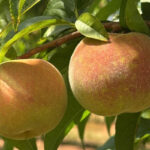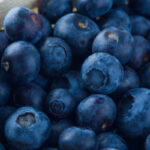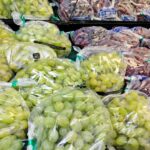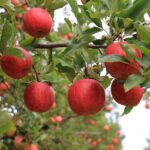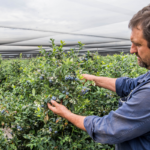NZ: First "big year" in China for Rockit apples

A third of the crop of this convenience-focused apple is now sold in China, while volume is set to triple over the next two seasons.
From the U.S. to China sales are "taking off" for a small and sweet apple from New Zealand known as 'Rockit', but as far as potential is concerned the variety is only just getting started.

Rockit Trading Company sales and marketing coordinator Anna Cudby says volume is set to be up by more than a quarter this year, at about 85 (40ft equivalent) containers.
"Next year we’ll probably do about 150 or thereabouts, and then the following year it’ll probably be 250, so the growth curve is massive," she says.
"We're always looking for new markets to develop. This is our first big year in China so that probably would have been been a third of our business, and Asia is our biggest market.
"For China last year we might have done 2.5 40ft equivalents but this year we’ve blown that out of the water."
She says volumes sent to Taiwan are similar, while other key markets include Hong Kong, the U.S., Vietnam, Malaysia, Singapore, Thailand, and for the first time this year, Indonesia.
She adds there are still about 10-20 containers of Rockit apples still to be shipped this season, with all fruit likely to be sold by September.
 The small apples are also pre-washed and packed into a special plastic tube by the company so consumers can trust the fruit hasn't been handled along the way in the supply chain.
The small apples are also pre-washed and packed into a special plastic tube by the company so consumers can trust the fruit hasn't been handled along the way in the supply chain.
Rockit, which is part of the Havelock North Fruit Company (HNFC), has a policy of working with just one to three exclusive distributors in every territory where the fruit is sold.
"In China we’ve got three importers and they each look after a channel – we’ve got Golden Wing Mau who look after the supermarkets and wholesale markets, but at the moment because our volumes are so limited they’re just going to the high end supermarkets, in particular Sam’s Club and Ole," Cudby says.
"They’re doing very well there and then we’ve got our licensee for e-commerce, and that’s FruitDay, and then we’ve got a licensee for foodservice so that’s smaller, specialty fruit stores which are selling through Pagoda.
"Asia is a real good target market for us in so many ways - all the research shows people are moving towards convenient products and also snack products, and the hygiene, ready-to-eat aspects are all positive for us," she says.
Cudby also mentions the product is ideal for China's gifting culture, while consumers are also willing to pay a premium for the clean and green reputation associated with New Zealand's fruit.
"It's so unique. Obviously it's snack size being 1.5 times the size of a golf ball, so three or four bites and you're done.
"It’s crisp, it looks great, it has a great red coloring, it's juicy - there's everything you’d want from an apple."
Global production plans
The apple's prospects are also high in the U.S., which at the moment has the largest plantations of the variety outside in New Zealand, grown by Chelan Fresh and Borton Fruit.
"We’ve also got growers all over the world now – their crops aren’t massive yet, but certainly the USA will have quite large crops in three to five years’ time," she says.
"We’re also growing in Italy, Spain, Germany, France, Benelux, U.K. and Australia."
To date though, the problem in the U.S. has been securing enough quantity to meet retailers' needs.
"They wanted six containers to be sent in the next week or two, or a whole season-long plan of 40 containers but we just don’t have the volume or capacity to keep up with that kind of demand at the moment," she said.
"Next year and the year after our growth will be massive and we’ll have more capacity to fill those orders – we have already been doing smaller amounts into the U.S.
"Our growers there have a lot more trees coming online in the next few years and it will be key to get that 12-month supply to get those large orders."
Even though Rockit has branched out to Australia for the Southern Hemisphere end of its 12-month deal, in a partnership with Lenswood, New Zealand will form the bulk of the export program over the Northern Hemisphere summer.
"It was founded here, it was bred here in Hawke’s Bay, our headquarters are here, so the vision is to always have the majority coming out of New Zealand but also having supporting markets for the aspects they bring," she says.
In Europe the approach is a bit different to the U.S., with Rockit taking note of a stronger 'eat local' trend in many key markets.
"One thing that we’ve found with Europe and why we haven’t probably exported there as much is that they have placed a lot of importance on locally-grown produce and food," Cudby says.
"As an example, with our German licensee we were seeing if they wanted to start off with with product from New Zealand, but they said people didn't just want German product but they wanted to buy from a local grower less than 200km (124mi) down the road.
"But I think once markets are established with local product and that’s supported with marketing, if they know the product is available 12 months a year and stores know that people want it, I think they’ll be more likely to import from New Zealand."
Adding value
As with most orchards and fruits, not all the production meets the standards necessary for Rockit's branding and packaging, but the company is about to launch a new program which will make the most of that crop. 
"We’re just about to launch a Rockit apple juice and apple puree which are 99.99% natural - when I say natural I mean made out of Rockit apples.
"Those are a couple of other quirky Rockit-branded products we will be launching and they both fit with our healthy, natural brand image, and with the puree being child-friendly as well.
"There’s a small percentage of product that might be low-color or too big or small to put into a tube, so those apples can be utilized and make these other great products that fit under the Rockit umbrella."
When asked whether the company will be looking at other processing options like freeze-drying, Cudby says it's in Rockit's spirit to take a proactive approach to new possibilities.
"When Phil Allison our founder first discovered the variety, everyone was trying to grow big apples so no one was interested in buying the global rights to the variety. But he saw something different.
"I think he did a great job of not only seeing so much potential in the apple, but the way he positioned and marketed it in the tube is totally new.
"He’s a strong kind of yes man, so anything is possible. I wouldn’t say no to freeze dried or anything but at this stage we’ll probably focus on apples in the tube, and the puree and the juice."
















